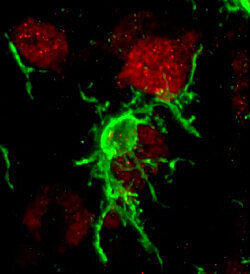Targeting gut microbes to potentially make a blood pressure medication more effective is focus of new grant

Can gut microbes be targeted to possibly make blood pressure medication more effective? That’s the question being studied by University of Florida Health researcher Tao Yang, Ph.D. Tao has been awarded a grant to investigate how intestinal microbes may cause dysfunctional gut-brain connections.
Tao believes the unique gut microbes associated with high blood pressure hinder the biochemical signaling between the gastrointestinal tract and the central nervous system — the so-called gut-brain axis. That, in turn, may influence the effectiveness of antihypertensive drugs.
Nearly half of all adults in the United States have high blood pressure, the American Heart Association found in 2018. That puts an estimated 103 million people at risk for heart attacks and strokes.
With the $50,000 Biocodex Microbiota Foundation grant awarded Tuesday (Jan. 29), Tao will work to demonstrate the differences in human gut microbes between people with and without high blood pressure. Rodent models implanted with gut microbes from human high-blood pressure patients will be used to determine how the gut-brain connection and response to antihypertensive drugs are affected. Studies have already indicated that gut flora affects hypertension treatment and can even block certain medications effectiveness, Tao said.
Ultimately, he hopes to show that gut microbes can be “rebalanced” to make blood pressure medication more effective.
“People take a lot of medications every day to keep their blood pressure low and, initially, that is what inspired me to pursue this research. My research proposal aims to cure or improve the treatment of hypertension,” he said.
Tao is a postdoctoral associate in the department of physiology and functional genomics at the University of Florida College of Medicine, part of UF Health.
About the author
